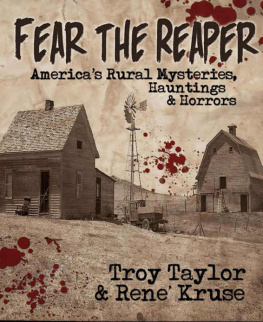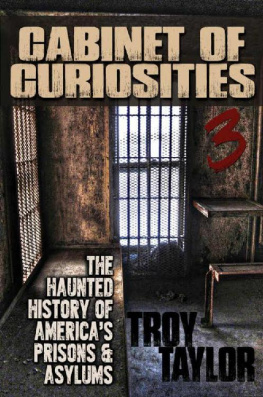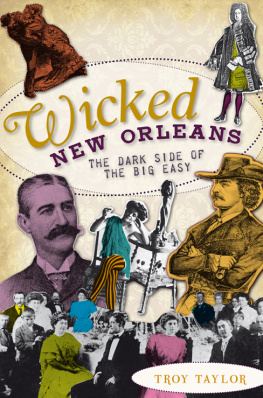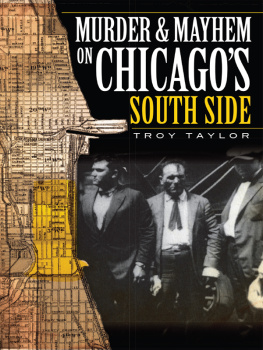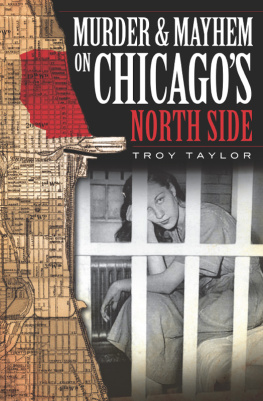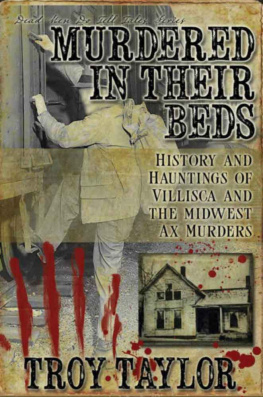

INTRODUCTION By Troy Taylor
Eighty years later, it was still the most famous murder and suicide in the small town where I grew up. I lived on an Illinois farm during my adolescent and teenage years, and the closest town to us was a place called Moweaqua (a Native American word that was said to mean muddy water.) It was a rural community, built up around farming and a coal mine that closed down after a disaster in 1932 that killed fifty-four miners. But the Portwood Murder was still whispered about after eight decades and was still distantly recalled as one of the dark spots in the towns history.
It happened on September 10, 1905. Henry Portwood was a wealthy retired farmer who had owned a large farm about two miles east of town until 1903. He was respected and generally well-liked in the community. He had served in the Union Army during the Civil War, enlisting in 1862 at age seventeen, and was a quiet and industrious man. After he retired from farming, he purchased a home from H.C. ODell, which was located on the northeast edge of Moweaqua. On Sunday morning, September 10, he cut the throat of his fourth wifenearly severing her head, the newspaper said before slashing his own throat with a straight razor. Mrs. Portwood died quickly but her husband lived for several hours, first claiming that God had killed his wife and then confessing when he was told that his son would be blamed for the crime. The boy, Everett, age nine, had discovered his father and step-mother lying in pools of blood on their bedroom floor and was the first to raise the alarm about the tragic event. Ironically, it was Everett who was the source of the problems between the husband and wife, which led to the murder-suicide.
The newspapers stated, Moweaqua is greatly excited because of the awful deed of the enraged husband.
Portwood had been a widower three times over. All of his previous wives had died, including Everetts mother, who passed away in 1902. This never generated much sympathy from his fourth wife, Mollie. Just twelve years younger than her husband, Mary Helen Doyle, who went by the name of Mollie, was born in Bunker Hill, Illinois, and had moved to Moweaqua with her family when she was a child. As far as I can learn, she had never been married before becoming engaged to Portwood, who began courting her the same year that his third wife passed away. It was a troubled marriage, and Mollie never got along with Everett. She constantly complained about the boy, perhaps because he served as a reminder of Portwoods previous marriage or because of the boys behavior, since those who knew the family stated that she was often angry because Portwood would never allow her to discipline the boy.
The constant disagreements about Everett led to the couple separating for a brief time in July 1905. They stayed apart for about two weeks and then reconciled. According to friends and witnesses, they seemed to be getting along well, even as little as an hour before the murder took place. The Portwoods had been visiting with neighbors that Sunday morning and they seemed in good spirits, the neighbors later told police.
But around 10:30 a.m., something occurred in the Portwood home that would never be revealed. Henry Portwood took the true reason for his wifes murder to the grave. A half-hour later, young Everett walked into his parents bedroom and found them lying there, surrounded by blood. Screaming for help, the horrified child ran out of the back door and gave the alarm to the closest neighbors. Several men ran into the Portwood house and discovered the awful scene.
The newspapers stated, The room looked like a slaughterhouse. Mollie was lying on the floor near the window. Her head had nearly been severed from her body by the brutal force of the cut. Blood was still flowing from the gaping wound and she twitched and gurgled, still showing signs of life. The damage that had been done to her throat prevented her from her speaking. With a wound to his neck almost as deep as his wifes, Portwood was lying a short distance away, almost in the doorway to the parlor. He was still alive, his feet kicking and his legs twisting as he thrashed about in his own blood. He was obviously in terrible condition, but he was in better shape than his wife.
Looking about, the men could see that a struggle had taken place in the room. Furniture was knocked over and the bed covers were twisted onto the floor. Everything in the room, from the bed to the walls, with spattered with blood. It was, the newspaper said, a scene more terrible than can be described.
Mollie had evidently been sitting at the north window of the bedroom, dressing her hair, when she was attacked by her husband. Bloodstains showed that she rose from her chair after she was cut. After his wife had been dealt with, Portwood had then turned the razor on himself, cutting fast and deep across his own throat.
Seeing that Portwood was still alive, one of the man pressed a cloth to his throat to try and stop the bleeding. The straight razor was on the floor, just inches from Portwoods hand. It was obvious to everyone what had happened. Cyrus Mitchell, one of the first to arrive on the scene, asked him why he had killed Mollie. But Portwoods replies were nonsensical, claiming that he had not killed his wife and that he had not been hurt. Mitchell told him that his throat had been cut, as had his wifes, and that he must have done it. He replied, Nobody cut my throat, did they? I did not do anything to my wife or myself.
Pressed to explain, Portwood insisted, I did not do it, God must have done it.
But Mitchell didnt let up. He insisted that Portwood confess to what he had done, even stating that the police might believe that it was Everett who committed the murders if Portwood died before admitting to what had happened. Apparently, this worked because the dying man made one more statement: Yes, I did it. But it dont make any difference why. It is all right.
And those were the last words that Portwood would speak about the murder. Dr. Pratt was summoned to try and save the mans life. He sewed up the wound in his neck, but his jugular had been severed and there was little he could do for him. Henry Portwood died later that afternoon a killer and a suicide. He never explained what had caused him to snap and murder Mollie. To this day, the motivations for the crime remain a mystery.
The bodies of the Portwoods were later examined by the Shelby County coroner and then an inquest was held on Monday. The verdict was as expected: murder and suicide. Henry was buried in Hayes Cemetery, outside of Moweaqua, and Mollie was buried separately in West Cemetery. They were divided, even in death.
As for Everett, he was taken in by his sister, Mrs. Frank Clark, Portwoods daughter with his second wife, Almira, who had died in 1883. She promised to take care of him, assuring the newspapers that he would be well raised. From there, Everett seems to vanish from history. I could find no trace of what became of the boy whose life was shattered by a single bloody event.
The idea for this book came to Ren and me while we were driving from her home in southwest Pennsylvania to Gettysburg one spring during one of our annual outings. When we travel anywhere together, it always turns into a multi-hour gabfest, as Ren calls it. She told me about the White Rocks Murder, which is included in this book. I told her that she needed to write that story up for inclusion in some future book, but I had no idea what book it would be. At that time, we had recently written our first book on American disasters and hauntings ( And Hell Followed With it ) and were in the midst of planning the sequel. The idea for Fear the Reaper was still coming, and when I put it together, I asked Ren to not only contribute the story of the White Rocks Murder, but to co-author the book with me.
Next page
